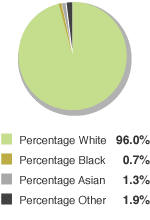New Hampshire and the horse race
Hillary Clinton 95,331 39%
Barack Obama 89,360 37%
John Edwards 41,190 17%
Bill Richardson 11,178 5%
Dennis Kucinich 3,371 1%
Joe Biden 543 0%
Mike Gravel 342 0%
Chris Dodd 163 0%
Precincts Reporting - 259 out of 301 - 86%
Republican Presidential Primary
Candidate Votes Percent Winner
John McCain 74,847 38%
Mitt Romney 63,818 32%
Mike Huckabee 22,253 11%
Rudy Giuliani 17,455 9%
Ron Paul 15,588 8%
Fred Thompson 2,446 1%
Duncan Hunter 1,007 1%
Undoubtedly it's childish of me to point this out, but Dennis Kucinich's one percent is bigger than Fred Thompson's one percent.
96 percent? boy New Hampshire's white. Iowa, New Hampshire...South Carolina. Makes you wonder.

Glenn Greenwald(Jan 7th):
...Aside from the fact that these endless prediction games completely overwhelm any substantive discussions, their guesses -- which are really wishes -- are almost always dreadfully wrong and plainly designed to advance their concealed agenda for which candidates they like and dislike. Why is any of that something that reporters ought to be doing at all? Is there any distinction between what a "reporter" does and what a "pundit" does covering this campaign? There doesn't seem to be any.
As but one example, consider this new daily tracking poll today from Rasumussen Reports. At least according to this poll, it is true that there has been one candidate who has been genuinely surging in the last week or two among Democratic voters nationally -- John Edwards...
[...]
I'm not focusing on the accuracy of horse-race predictions here, but instead, on the fact that the traveling press corps endlessly imposes its own narrative on the election, thereby completely excluding from all coverage plainly credible candidates they dislike (such as Edwards) while breathlessly touting the prospects of the candidates of whom they are enamored. Their predictions (i.e., preferences and love affairs) so plainly drive their press coverage -- the candidates they love are lauded as likely winners while the ones they hate are ignored or depicted as collapsing -- which in turn influences the election in the direction they want, making their predictions become self-fulfilling prophecies.It's just all a completely inappropriate role for political reporters to play, yet it composes virtually the entirety of their election coverage. Go read Time or The New Republic or The Politico or The Washington Post and see if you can find any examples of straight factual reporting about the remaining candidates, their positions, anything substantive -- rather than endless, group-think gossip about tactics and winning/losing predictions. It basically doesn't exist (here's an interview Ana Marie Cox conducted with John McCain yesterday where she tried to press him on his comment that we should remain in Iraq for 100 years -- notable because it's so rare to find any questions of this type).
I realize none of this is a revelation. But it's still astonishing how extreme it is. The point isn't just that this empty chatter squeezes out anything more meaningful -- it does -- but that it completely drives voter perceptions and controls the ability of candidates to be heard.
Here is an interview with Fred Thompson on the Today Show where he makes this point quite well, chiding the interviewer for asking him about nothing other than the sorts of speculative, irrelevant predictive matters that dominate press coverage, to the complete exclusion of anything he is trying to argue as part of his campaign. Inventing exciting dramatic narratives and predicting outcomes just isn't the role of a political reporter, even thought it's what most of them to do to the exclusion of all else.
the Greenwald passage above is from a much longer piece, "The role of political reporters" from Monday's Salon. It's not directly related to the results in New Hampshire, but it's definitely worth reading in its entirety(above emphases are mine).
Labels: democratic party, New England, politics, Republican Party





<< Home